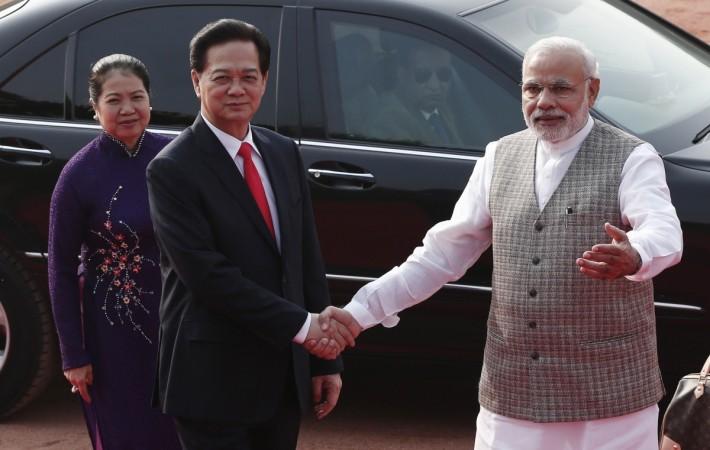
Vietnam Prime Minister Nguyen Tan Dung and his Indian counterpart Narendra Modi has on Tuesday signed seven agreements and in one of them Vietnam has offered two more oil blocks for exploration in the disputed South China Sea.
This decision is likely to irk China, which has always been against India's oil exploration projects in the South East Sea, which China considers as "Chinese waters." Despite Chinese objection, both sides signed the agreement along with other areas including "science & technology, culture & education, tourism."
"I thanked Prime Minister for Vietnam's commitment to collaboration with India in its oil and gas sector and its additional offer of exploration blocks. We will continue to deepen our cooperation in this sector and associated downstream industry," Zee News quoted Modi as saying.
On his two-day diplomatic tour in India, Dung not only offered more oil blocks, but also allowed India to let its naval ships pass through the South East Sea, where China has raised its objection to the Indian presence.
On Monday, he sought India's support to extend help to settle disputes in the South East Sea. In September, China had asked India to remove its naval ship INS Airavat, on its way to Vietnamese port, from South China Sea, according to The Times of India report.
Brunei, the People's Republic of China, Taiwan, Malaysia, the Philippines, and Vietnam have been in dispute over island and maritime claims on the South China Sea.
To settle these disputes peacefully, Dung has asked India to support other nations. He said "Vietnam hopes that India, with its increasingly important role, will make positive and responsible contributions to the maintenance of peace and stability in the region and the world."
"The proper settlement of disputes in the East Sea for peace, stability, maritime security and safety and freedom of navigation in the region is in the common interest of countries in the region and beyond," Dung told PTI in an interview.
"In that spirit, Vietnam hopes that India, as a major power in the region and the world, will actively support the parties concerned to peacefully resolve all disputes, refrain from actions that may further complicate the situation, thus contributing to the maintenance of peace, stability, maritime security and safety and freedom of navigation in the East Sea," he added.





!['It's not Mumbai traffic, it's air traffic': Suriya apologises to Mumbai media after paparazzi yelled At Him for making them wait for hours [Watch]](https://data1.ibtimes.co.in/en/full/806234/its-not-mumbai-traffic-its-air-traffic-suriya-apologises-mumbai-media-after-paparazzi.jpg?w=220&h=138)
![Bigg Boss 16-fame Sreejita De and Michael Blohm-Pape exchange wedding vows in dreamy Bengali ceremony [Inside Pics]](https://data1.ibtimes.co.in/en/full/806233/bigg-boss-16-fame-sreejita-de-michael-blohm-pape-exchange-wedding-vows-dreamy-bengali-ceremony.jpg?w=220&h=138)






